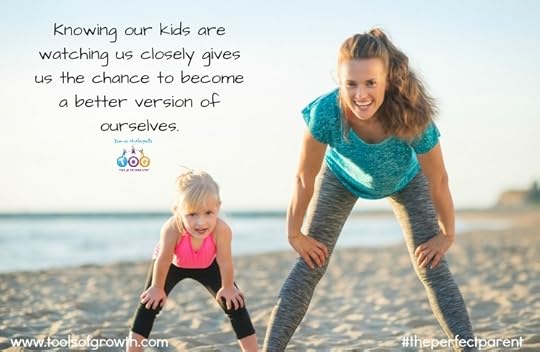Our Best Selves… But Better!
When my daughter, Nitasha, was just starting elementary school, she came to me one day and said, “Mommy, I want to grow up to be just like you.”
The question caught me off guard, and I asked her, “Why?”
“Because you’re smart, you’re kind, and you’re pretty, “ she answered, looking up at me with her big smiling eyes.
The voice inside my head said, “Really? I don’t think so. If only you knew! Yesterday, I screamed at your dad during a disagreement. Last week, I called your teacher a name—in my mind—when she said that you weren’t B-grade material in math. I’ve called in sick to work so I could attend your brother’s graduation, and I’ve told other little white lies to those close to me!”
Of course our kids want to be just like us. From the time they are born, we are all they know. We are their everything. That’s great and makes us feel honored and proud. But they see us from the outside; only we know what we are like on the inside. Oftentimes, we probably feel we don’t quite fit the standard of what we want our kids to be.
And really, deep down we shouldn’t want our children to be carbon copies of us. What we want is for them to be their own best selves.
Alison Gopnick, author of The Philosophical Baby, has studied in depth the science of babies and children and how they develop their identity. From birth, she notes, kids’ sense of self is tied in with the primary caregiver: “We know that children’s conception of a continuous separate self develops slowly in the first five years.…And attachment research shows that babies develop a deep connection to a few particular, special, beloved caregivers.”
What does that mean? It means that we can use that opportunity to encourage our kids not to strive to be like us but to embrace their own selves and be the best them they can be.
How do we do that and why is it important?
Share and honor our similarities and differences. It’s important to share with our kids how we are similar and yet focus on what makes us different from each other. Celebrate the qualities they have that make them unique by encouraging a clear understanding of their individuality. This builds our children’s connection with themselves and helps them create a better understanding of their own strengths and weakness—grounding them with self-confidence and self-esteem.
Encourage self-exploration. Life is a process of self-discovery, and the first steps to that start with our direction and guidance. Allow children to explore their interests, likes, dislikes, and their higher vision of themselves. Let them find out if they love dance or music or sports without any expectations from us. Let them discover what they enjoy and what agitates them, triggers them, and motivates them. When we take the pressure off, we allow them to explore and get to know themselves. This helps them achieve self-understanding, resilience, motivation, and self-reliance.
We should also remember not to put pressure on ourselves to be the “perfect” role model. Kids will see it all—the good, the bad, and the ugly. Our job is to show them that there can be a balance. We all make mistakes; they will, too, and that is how we all learn and grow.
Of course, knowing our kids are watching closely, we also have the chance to become a better version of ourselves.
The post Our Best Selves… But Better! appeared first on Tools of Growth.




